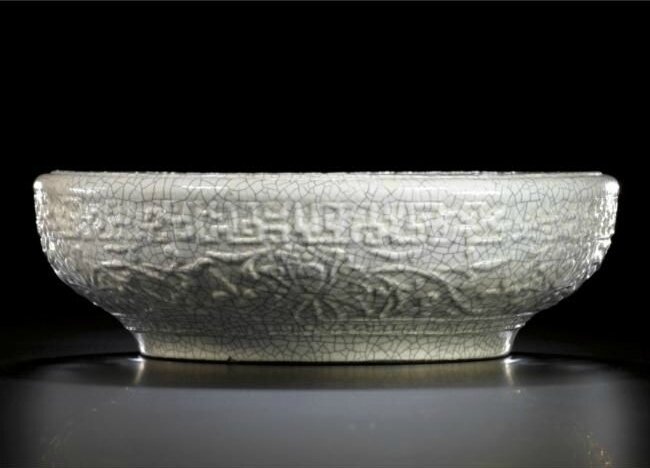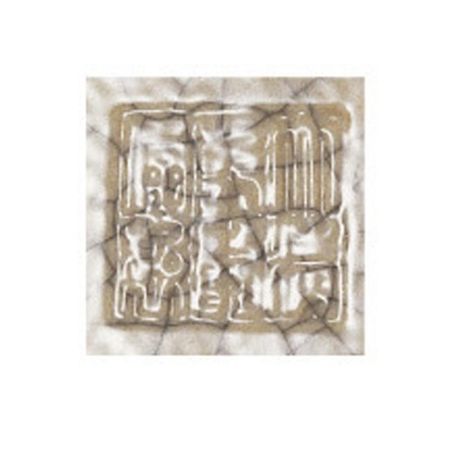Yongzheng and Qianlong monochromes @ Sotheby's Hong Kong, 08 Apr 10
Lot 1801. A fine blue-glazed vase, Mark and period of Yongzheng (1723-1735); 38.3 cm., 15 1/8 in. Est. 800,000—1,000,000 HKD. Lot Sold 3,140,000 HKD. Photo Sotheby's 2010
the slender ovoid body surmounted by a tall waisted neck flared towards the rim, covered overall with a rich purplish-blue glaze leaving a white edge around the rim, the interior and base glazed in white .
Provenance: Sotheby's Hong Kong, 9th November 1982, lot 267.
Sotheby's Hong Kong, 2nd November 1998, lot 313.
Note: It is extremely rare to find Yongzheng vases of this shape and glaze; see a closely related Qianlong example of smaller proportions, in the Huahaitang collection, included in the exhibition Ethereal Elegance. Porcelain Vases of the Imperial Qing, The Chinese University of Hong Kong, Hong Kong, 2007, cat. no. 17. For a Yongzheng vase of this form, painted with chrysanthemums and butterflies in famille-rose enamels, see one sold in our London rooms, 1st April 1974, lot 353, and again in these rooms, 29th November 1977, lot 158; and a smaller example, but covered in a celadon glaze, offered in our London rooms, 16th May 2007, lot 109.
In form, the present vase is reminiscent of Yongzheng vases carved in relief with a tall band of petal lappets at the base, seen in an outline drawing published in Geng Baochang, Ming Qing ciqi jianding, Hong Kong, 1993, p. 234, pl. 400, fig. 12; and a blue and white example, in the Palace Museum, Beijing, illustrated in Kangxi. Yongzheng. Qianlong. Qing Porcelain from the Palace Museum Collection, Hong Kong, 1989, p. 175, pl. 4.
Lot 1922. A rare Ru-type vase, Qianlong seal mark and period (1736-1795); 21.3 cm., 8 3/8 in. Est. 1,200,000—1,800,000 HKD. Lot Sold 2,300,000 HKD. Photo: Sotheby's 2010.
the slightly compressed bulbous body rising from an octagonal foot to a columnar neck and an everted trumpet mouth, the body accented with eight sets of triple vertical ribs extending above the foot and merging into a single rib at the octagonal-facetted neck, the body and neck further divide by four horizontal rings, all beneath a pale watchet-blue glaze suffused with a fine network of golden crackles, the glaze thinning along the ribs exposing the white body, the underside inscribed with an underglaze blue with a six-character reign mark.
Note: This type of raised ring vessel evolved from excavated Song Guan ware from the Laohudong Guan ware kilnsite of the Southern Song in Hangzhou. Similar vases can be found in the Huaihaitang Collection, illustrated in Ethereal Elegance, Art Museum at the Chinese University of Hong Kong, Hong Kong, 2008, cat. no. 27 and a pair from the Mr. and Mrs. J.M. Hu Collection in the Shanghai Museum illustrated in Imperial Monochromes: The Zande Lou Collection, Shanghai Museum, Shanghai, 2005, cat. no. 29.
Lot 1926. A fine pair of Qingbai-style stemcups, Seal mark and period of Yongzheng (1723-1735); 9 cm., 3 1/2 in. Est. 1,000,000—1,500,000 HKD. Lot Sold 1,220,000 HKD. Photo Sotheby's 2010
each with slightly flared steep sides rising from a flat base, supported on a tall hollow splayed foot, the interior of the cup carved with a pair of phoenix separated by two peonies, the four-character reign mark neatly inscribed in white slip on the base of the interior, all beneath a pale blue-green glaze.
Note: Delicately potted and carved to the interior, with a phoenix and peonies, the kings of birds and flowers, the angular form of the present pair of stemcups is rare; see a closely related example in the Tsui Museum of Art, Hong Kong, illustrated in The Tsui Museum of Art. Chinese Ceramics IV – Qing Dynasty, Hong Kong, 1995, pl. 18.
By the Qing dynasty, stemcups were held in great esteem as a form and figured prominently in rituals as well as gifted to Tibetan and Mongolian lamas and nobles. It is quoted that on the twenty-second day of the second month of the tenth year of Yongzheng's reign, the emperor sent an order to Nian Xiyao requesting, 'Make some stemcups in each of these colours: sacrificial red, sacrificial blue, yellow and white. Also have some heavier pieces ready for bestowal on Mongolian nobles as occasions arise' (see ibid., p. 45).
For examples of the more commonly known white-glazed Yongzheng stemcups with rounded cup and incised decoration, see one in the Tianminlou Collection, published in Chinese Porcelain: The S.C. Ko Tianminlou Collection, Hong Kong, 1987, pl. 134; another sold in these rooms, 14th November 1983, lot 154; and a third example sold at Christie's New York, 18th September 2003, lot 331.
During the Qianlong period, stemcups of this form were decorated with lança characters and lotus scrolls, reflecting the emperor's interest in Lamaist Buddhism; see one in the National Palace Museum, Taipei, included in the Special Exhibition of K'ang-his, Yung-cheng and Ch'ien-lung Porcealin Ware from the Ch'ing Dynasty, National Palace Museum, Taipei, 1986, cat. no. 69.
Lot 1924. A fine guan-type vase, fanghu, Seal mark and period of Qianlong; 14 cm., 5 1/2 in. Est. 300,000—500,000 HKD. Lot Sold 680,000 HKD. Photo Sotheby's 2010
of finely potted rectangular section with facetted sides, sitting on a low straight foot, the pear-shaped body rising to a tall waisted neck, flanked with a pair of tubular lug handles, covered overall in a thick bluish-grey glaze suffused with an irregular network of thin black crackles and golden threads, the base similarly glazed with a six-character reign mark in underglaze blue.
Provenance: Mayuyama & Co. Ltd.
Lot 1923. A ge-type soft-paste washer, Seal mark and period of Qianlong (1736-1795); 12.7 cm., 8 7/8 in. Est. 150,000—250,000 HKD. Lot Sold 200,000 HKD. Photo Sotheby's 2010
the rounded sides rising from a tapered footrim to an incurved rim, the mouth encircled by a key-fret border, moulded to the exterior with a frieze of flowers and foliage between two further key-fret bands, covered overall with a thick ivory-white glaze suffused with an irregular network of fine dark-grey crackles and golden threads, the countersunk base impressed with a six-character reign mark.
Lot 1930. A yellow-glazed 'Dragon' dish, mark and period of Qianlong (1736-1795); 17.3 cm., 6 3/4 in. Est. 150,000—180,000 HKD. Lot Sold 200,000 HKD. photo Sotheby's
incised in the interior with a medallion enclosing a dragon amidst scrolling clouds in pursuit of a flaming pearl, the exterior similarly decorated, the deep rounded sides set on a low straight foot rising to an everted rim, the base inscribed with a six-character reign mark in kaishu within double-circles.
Note: Incised dragon dishes of this type from the Qianlong period is more commonly found with seal marks; it is rare to find a dish of this type with a kaishu reign mark.
Sotheby's. FINE CHINESE CERAMICS & WORKS OF ART. 08 Apr 10. Hong Kong

/https%3A%2F%2Fprofilepics.canalblog.com%2Fprofilepics%2F1%2F0%2F100183.jpg)
/https%3A%2F%2Fstorage.canalblog.com%2F03%2F02%2F119589%2F96711876_o.jpg)
/https%3A%2F%2Fstorage.canalblog.com%2F11%2F31%2F119589%2F94773502_o.jpg)
/https%3A%2F%2Fstorage.canalblog.com%2F20%2F83%2F119589%2F94772815_o.jpg)
/https%3A%2F%2Fstorage.canalblog.com%2F26%2F72%2F119589%2F75604929_o.jpg)
/https%3A%2F%2Fstorage.canalblog.com%2F59%2F60%2F119589%2F26458628_o.jpg)














/http%3A%2F%2Fstorage.canalblog.com%2F51%2F84%2F119589%2F122518624_o.jpg)
/http%3A%2F%2Fstorage.canalblog.com%2F42%2F87%2F119589%2F112989160_o.jpg)
/http%3A%2F%2Fstorage.canalblog.com%2F28%2F52%2F119589%2F112495720_o.jpg)
/http%3A%2F%2Fstorage.canalblog.com%2F12%2F27%2F119589%2F96148405_o.jpg)